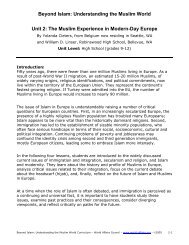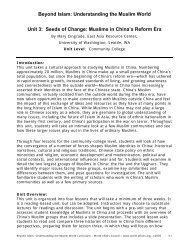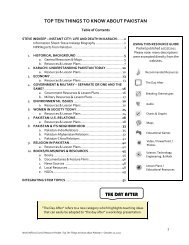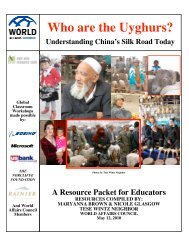The Question(s) of Tibet - World Affairs Council
The Question(s) of Tibet - World Affairs Council
The Question(s) of Tibet - World Affairs Council
Create successful ePaper yourself
Turn your PDF publications into a flip-book with our unique Google optimized e-Paper software.
TIBETAN YOUTH AT HOME AND IN EXILE<br />
CSM: TIBET PROTESTS CHINESE BEING TAUGHT AS SOLE LANGUAGE IN REGIONAL<br />
SCHOOLS (10/22/10)<br />
http://www.csmonitor.com/<strong>World</strong>/Latest‐News‐Wires/2010/1022/<strong>Tibet</strong>‐protests‐Chinesebeing‐taught‐as‐sole‐language‐in‐regional‐schools<br />
<strong>Tibet</strong> protests the Chinese government decision to teach only Chinese in regional schools.<br />
Students fear that means the current bilingual system will be scrapped in favor <strong>of</strong> using<br />
Mandarin Chinese alone, except in language classes. A report on Qinghai's plans for educational<br />
reform over the next decade was even more explicit, saying "the nation's common language<br />
must become the language <strong>of</strong> instruction." Use <strong>of</strong> the <strong>Tibet</strong>an language is tied to the region's<br />
political struggles. Many <strong>Tibet</strong>ans argue they have traditionally been self‐governing and that<br />
Chinese policies are wrecking their unique Buddhist culture. But the issue is complicated<br />
because while many <strong>Tibet</strong>ans feel threatened by development and the migration <strong>of</strong> China's<br />
ethnic Han majority, some also hope their children master Mandarin in order to obtain better<br />
jobs. Beijing defends its policies, saying they spur economic growth in the largely poor areas,<br />
but implementation has <strong>of</strong>ten been blunt and heedless <strong>of</strong> local opinion.<br />
THE TIBET POST: TIBETAN YOUTH CONGRESS MARCHES AGAINST CHINESE LANGUAGE<br />
REFORMS (11/4/10)<br />
http://www.thetibetpost.com/en/news/exile/1227‐tibetan‐youth‐congress‐marches‐againstchinese‐language‐reforms<br />
<strong>The</strong> protest was sparked by reported comments from the Chinese Communist Party's Qinghai<br />
chief, Qiang Wei, calling for the use <strong>of</strong> "a common language" in schools and suggesting that the<br />
introduction <strong>of</strong> Mandarin as the teaching language over the next decade.<br />
FRONTLINE: DREAMS OF TIBET: INTERVIEWS JAMYANG<br />
NORBU<br />
http://www.pbs.org/wgbh/pages/frontline/shows/tibet/intervie<br />
ws/norbu.html<br />
To make it that only Chinese language in any way will benefit<br />
the <strong>Tibet</strong>ans. So, that's why many <strong>Tibet</strong>ans, who really have no<br />
command <strong>of</strong> the Chinese or poor command <strong>of</strong> Chinese, really<br />
have no substantial job. <strong>The</strong>re's about 75 to 80 percent<br />
unemployment among the youth <strong>of</strong> <strong>Tibet</strong>. People just hanging<br />
out in the streets, drinking, playing pool.<br />
Q: <strong>Tibet</strong>ans don't seem to have the economic<br />
opportunity that the Chinese do, especially young<br />
people.<br />
A: Essentially, there is so much unemployment in<br />
<strong>Tibet</strong>, because the system is rigged against the<br />
<strong>Tibet</strong>ans. <strong>The</strong> people in power, at the top <strong>of</strong> the<br />
pyramid, are Chinese. And, in China, I think anyone<br />
who's traveled through China knows that the system<br />
is one <strong>of</strong> "<strong>The</strong> Back Door." If you want to have<br />
anything done, you need connections. <strong>The</strong>re is no<br />
way that you can do anything through a legitimate<br />
kind <strong>of</strong> channel. And then all the best jobs are<br />
reserved for the Chinese.<br />
GUARDIAN: US EMBASSY CABLES: ‘WIDENING GENERATIONAL DIVIDE’ BETWEEN<br />
TIBET’S LEADERS AND YOUTH (12/16/10)<br />
http://www.guardian.co.uk/world/us‐embassy‐cables‐documents/160094<br />
A May visit to six <strong>Tibet</strong>an settlements across north and northeastern India underscores<br />
concerns that frustrated and dissatisfied <strong>Tibet</strong>an youth and concurrent Indian separatist<br />
movements could pose serious problems for the future viability <strong>of</strong> <strong>Tibet</strong>an settlements. A<br />
widening generational divide finds <strong>Tibet</strong>an leaders unable to resolve growing dissatisfaction<br />
among younger <strong>Tibet</strong>ans, led by the influential <strong>Tibet</strong>an Youth Congress (TYC). Settlement<br />
leaders in West Bengal reluctantly discussed intimidation and extortion <strong>of</strong> <strong>Tibet</strong>ans by Indian<br />
separatist movements, feebly dismissing the threats as "neighborly" interactions. <strong>Tibet</strong>an<br />
participation in events organized by pro‐Gorkaland radicals—whether forced or not—could<br />
jeopardize relations between the <strong>Tibet</strong>an community and their Indian hosts. <strong>The</strong> Central<br />
<strong>World</strong> <strong>Affairs</strong> <strong>Council</strong> Teacher Resource Packet – <strong>The</strong> <strong>Question</strong>(s) <strong>of</strong> <strong>Tibet</strong> February 28, 2011<br />
42











